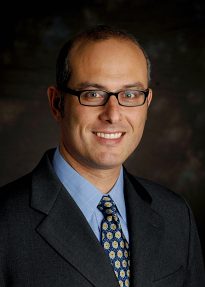Jonathan Todres publishes op-ed on child trafficking prevention in Atlanta Journal-Constitution
March 11, 2010
ATLANTA—Georgia State University College of Law Professor Jonathan Todres published an opinion piece in the Atlanta Journal-Constitution on Feb. 23 on child trafficking and prevention.
 The topic of child trafficking has come to the forefront in recent weeks in the wake of the eathquake in Haiti, where, Todres notes, many children left homeless are now at risk of being trafficked. Child trafficking is not new to Haiti, Todres writes, or to any other part of the world. It is a global phenomenon that victimizes millions of children, including many here in the United States.
The topic of child trafficking has come to the forefront in recent weeks in the wake of the eathquake in Haiti, where, Todres notes, many children left homeless are now at risk of being trafficked. Child trafficking is not new to Haiti, Todres writes, or to any other part of the world. It is a global phenomenon that victimizes millions of children, including many here in the United States.
"At the end of each day, as we gather around the dinner table with family and friends, children around the world have spent their day toiling in sweatshops and mines, on farms, in the sex industry, in forced begging operations and in domestic servitude, where they are subjected to persistent physical, mental and often sexual abuse."
Todres teaches Human Rights and Children, Public Health Law, International and Comparative Health Law, and Torts. His research focuses on children's rights and health law issues.
In his piece, "Root out child trafficking with prevention," Todres writes that "over the past decade, the United States and many other governments have taken significant actions to combat human trafficking, but their approach is flawed. Little attention is paid to the ultimate goal - prevention. In all my research over the past decade, I haven't found any evidence suggesting that child trafficking has declined, despite the good intentions of many governments. In fact, it might be increasing."
Although the international community has agreed upon a sensible, comprehensive three-pronged approach to combating trafficking, often referred to as the three P's– 1. punishment of perpetrators; 2. protection of victims; and 3. prevention –in reality governments have focused primarily on the first step and, to some extent, on the second, he writes.
"Prevention, however, has been largely ignored, even though without it we will be caught in an endless cycle of chasing perpetrators and providing victims services after the harm to children has already occurred. Many assume that tough criminal laws count as prevention. But as we have seen in the drug trade, criminal law alone is not enough.
"We need to focus seriously on prevention. We need a national plan of action to facilitate effective, coordinated responses to child trafficking. In 2008, the United States passed the PROTECT Our Children Act, which aimed to create such a plan. It's a good step, but a review of the legislation reveals it to be essentially law enforcement-centered. A national plan of action must include victim assistance and comprehensive prevention measures."
To read the full piece, go to the AJC website.
Todres serves as a regular advisor to non-governmental organizations working to combat commercial sexual exploitation of children. He also has held several leadership posts within the ABA Section of International Law, including Chair of the Section's International Health Law Committee and Vice-Chair of its International Human Rights Committee. Todres is the co-editor of U.N. Convention on the Rights of the Child: An Analysis of Treaty Provisions and Implications of U.S. Ratification (2006) and a number of articles on children's rights and health law issues.